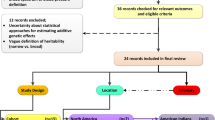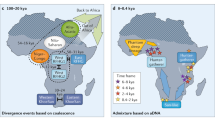Abstract
The complexity of factors influencing the development of hypertension (HTN) in African Americans has given rise to theories suggesting that genetic changes occurred due to selection pressures/genetic bottleneck effects (ie, constriction of existing genetic variability) over the course of the slave trade. Ninety-nine US-born and 86 African-born health professionals were compared in a cross-sectional survey examining genetic and psychosocial predictors of HTN. We examined the distributions of three genetic loci (G-protein, AGT-235, and ACE I/D) that have been associated with increased HTN risk. There were no significant differences between US-born African Americans and African-born immigrants in the studied genetic loci or biological variables (eg, plasma renin and angiotensin converting enzyme activity), except that the AGT-235 homozygous T genotype was somewhat more frequent among African-born participants than US-born African Americans. Only age, body mass index, and birthplace consistently demonstrated associations with HTN status. Thus, there was no evidence of a genetic bottleneck in the loci studied, ie, that US-born African Americans have different genotype distributions that increase their risk for HTN. In fact, some of the genotypic distributions evidenced lower frequencies of HTN-related alleles among US-born African Americans, providing evidence of European admixture. The consistent finding that birthplace (ie, US vs Africa) was associated with HTN, even though it was not always significant, suggests potential and unmeasured cultural, lifestyle, and environmental differences between African immigrants and US-born African Americans that are protective against HTN.
This is a preview of subscription content, access via your institution
Access options
Subscribe to this journal
Receive 12 digital issues and online access to articles
$119.00 per year
only $9.92 per issue
Buy this article
- Purchase on Springer Link
- Instant access to full article PDF
Prices may be subject to local taxes which are calculated during checkout
Similar content being viewed by others
Author information
Authors and Affiliations
Corresponding author
Rights and permissions
About this article
Cite this article
Carlos Poston, W., Pavlik, V., Hyman, D. et al. Genetic bottlenecks, perceived racism, and hypertension risk among African Americans and first-generation African immigrants. J Hum Hypertens 15, 341–351 (2001). https://doi.org/10.1038/sj.jhh.1001174
Received:
Revised:
Accepted:
Published:
Issue Date:
DOI: https://doi.org/10.1038/sj.jhh.1001174
Keywords
This article is cited by
-
African Immigrants in New York City with Hepatitis B-Related Hepatocellular Carcinoma Demonstrate High Morbidity and Mortality
Journal of Immigrant and Minority Health (2022)
-
The Immigrant Health Advantage: An Examination of African-Origin Black Immigrants in the United States
Population Research and Policy Review (2021)
-
Theories for Race and Gender Differences in Management of Social Identity-Related Stressors: a Systematic Review
Journal of Racial and Ethnic Health Disparities (2019)
-
Racism and Hypertension: A Review of the Empirical Evidence and Implications for Clinical Practice
American Journal of Hypertension (2011)
-
The effect of genetic variation in angiotensinogen on serum levels and blood pressure: a comparison of Nigerians and US blacks
Journal of Human Hypertension (2006)



